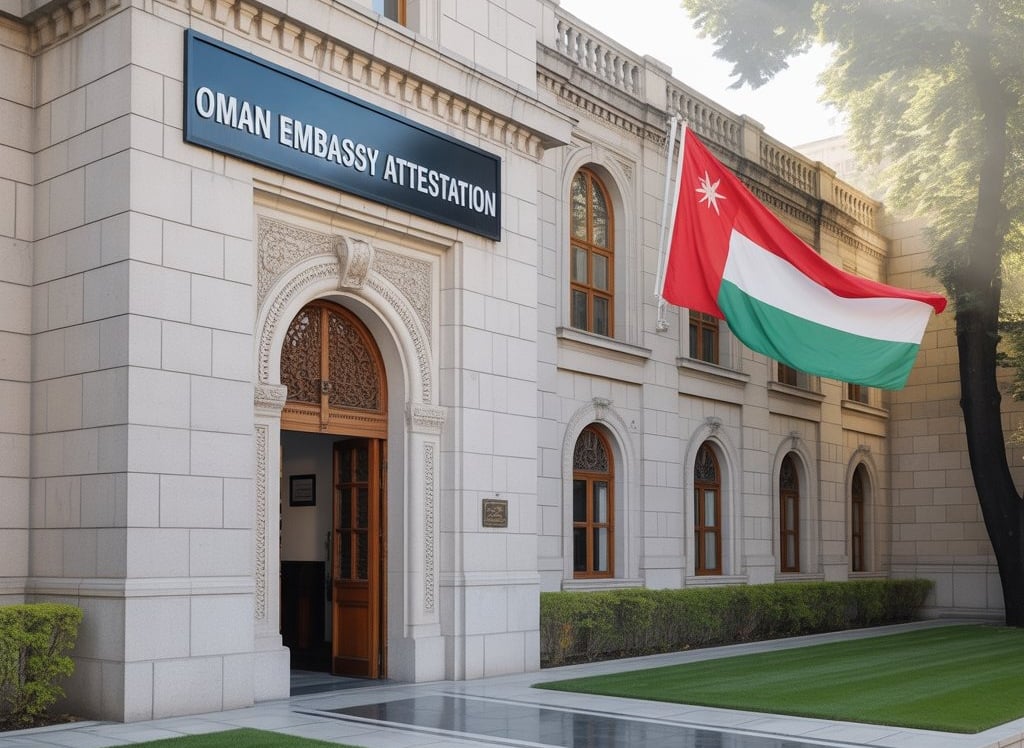Oman Embassy Attestation Process Explained
Learn about the Oman embassy attestation process, including key details on time, cost, and the step-by-step procedure for obtaining embassy attestation. Get all the information you need for a smooth attestation experience.
9/26/20257 min read


Introduction to Embassy Attestation
Embassy attestation is a vital process that validates the authenticity of documents intended for use in a foreign country, specifically Oman in this context. The significance of this procedure cannot be overstated, as it ensures that the documents presented are genuine and reliable, a prerequisite for acceptance by local authorities. Without proper attestation, individuals risk facing challenges when attempting to use their documents in Oman, such as educational certificates, marriage licenses, or business-related documents.
The legal importance of embassy attestation primarily lies in its function as a measure against fraud. Attestation serves as an assurance that the document has been verified and approved by the issuing authority of the relevant country. This verification is crucial for various purposes, including employment applications, visa processing, and real estate transactions, among others. The Oman embassy plays an essential role in this process, by providing the necessary authentication that allows documents to be recognized under Omani law.
Common types of documents requiring embassy attestation include educational certificates, birth and marriage certificates, powers of attorney, and commercial documents. Each type serves different legal and practical purposes, necessitating a thorough understanding of the requirements and protocols set forth by the Oman embassy. It is also important to note that the attestation process can differ based on the nature of the document, the issuing country, and specific regulations governing its usage in Oman.
In essence, embassy attestation is not merely a bureaucratic step but a crucial legal concept that ensures the recognition and legitimacy of documents within Oman. Understanding the intricacies of this process helps individuals prepare adequately for their interactions with the embassy, reducing the likelihood of delays or complications.
The Importance of Attestation in Oman
In Oman, document attestation is a legal procedure crucial for validating and recognizing the authenticity of various official documents. This process holds significant importance for individuals seeking employment, pursuing education, or applying for residency in the country. For expatriates and foreign nationals, attested documents are mandatory for numerous administrative procedures, as they ensure that the relevant authorities acknowledge the legitimacy of the papers presented.
One of the primary reasons for attestation is its necessity for employment. Employers in Oman often require attested educational certificates and employment letters to verify the credentials of prospective employees. Failure to provide properly attested documents can lead to disqualification from job opportunities, as organizations prioritize compliance with legal regulations. Moreover, attestation assures the employer that the candidate's qualifications are genuine and recognized by the relevant authorities.
Similarly, for individuals seeking higher education in Oman, educational institutions mandate that applicants submit attested documents. This requirement is critical as it substantiates the applicant's academic qualifications and allows for a smooth admission process. Without attestation, students may face difficulties in their applications, leading to delays or rejections.
Residency applications also hinge on the submission of attested documents. The Ministry of Interior in Oman requires applicants to present a range of documents, including birth certificates, marriage certificates, and educational qualifications, all of which must be attested. Inadequate documentation can result in rejected residency requests, creating significant challenges for individuals hoping to establish themselves in the country.
It is essential to understand that un-attested documents can lead to considerable pitfalls. Individuals may face legal repercussions, financial losses, or even deportation if their documents are found to be invalid. Therefore, it is imperative for anyone navigating through essential life transitions in Oman to ensure their documents are properly attested, thereby facilitating a smooth experience in the job market, educational institutions, and residency processes.
Step-by-Step Procedure for Attestation
The attestation of documents at the Oman embassy involves several crucial steps, ensuring that the submitted documentation meets the requirements set forth by the embassy. The procedure begins with document verification, which is necessary to confirm the authenticity of the documents intended for attestation. It is advisable to gather all relevant documents such as academic certificates, commercial papers, and personal identification before proceeding.
Once the documents are compiled, the next step involves notarization. This step requires a qualified notary public, who will review the documents for accuracy and authenticity. The notary will then affix their seal and signature, signifying that the documents are valid and prepared for further authentication. It is important to choose a notary experienced in handling attestation processes, as any discrepancies may lead to delays.
After notarization, the documents must undergo an authentication process through the appropriate authorities in the origin country. This typically includes verification from the Ministry of External Affairs or the relevant department. The authenticated documents are then ready for submission to the Oman embassy. Ensure that you also prepare copies, as the embassy may require them during the submission.
At the embassy, a formal application for attestation must be filled out, providing accurate details about the document and its purpose. Along with the application, the authenticated documents must be presented. Payment of the attestation fee is also required, which can vary based on the type of document and processing speed. Once all the steps are completed, the embassy will process the attestation, and notifications will be sent regarding the status of your request.
Timeframe: How Long Does the Attestation Take?
The attestation process at the Oman embassy can vary significantly based on several factors. Generally, the timeframe for document attestation ranges from a few days to several weeks. This duration depends on the type of document being attested, the volume of applications received by the embassy, and the efficiency of the service. Specific documents such as educational certificates may require additional verification, potentially extending the overall processing time.
One of the notable influences on the duration of the attestation process is the time of year when the application is submitted. During peak seasons, such as summer or the start of new academic sessions, embassies experience a surge in applications, which can lead to delays. To mitigate the extended wait times during these busy periods, applicants are encouraged to submit their documents well in advance of any deadlines that may be in place.
Moreover, the efficiency of the service provided plays a critical role. Each embassy may have its own set of operational procedures and the number of staff available to handle the attestation requests, resulting in differing timelines. Utilizing online services or checking the embassy's website for real-time updates can offer insights into current processing times.
To expedite the process, applicants can ensure that all necessary documents are in order and that they meet the specific requirements of the embassy. Additionally, working with a professional service that specializes in document attestation may help facilitate a quicker turnaround. Understanding these factors and planning accordingly can help applicants navigate the Oman embassy attestation process more efficiently, minimizing delays where possible.
Cost of Embassy Attestation in Oman
The cost of embassy attestation in Oman can vary depending on several factors, including the type of document being attested, the services required, and any additional fees associated with the process. Typically, the fees for attestation services are categorized by the type of document, which can include personal documents such as birth and marriage certificates, educational documents like degrees and diplomas, and commercial documents such as contracts and business licenses.
As a general guideline, the fees for attestation can range from approximately OMR 10 to OMR 50 per document. Personal documents tend to be on the lower end of the scale, while educational documents may incur higher fees due to their complexity and the level of verification required. It's important to verify the specific charges with the embassy or consulate, as these could change over time or vary based on your particular circumstances.
Additionally, there may be ancillary costs that one may need to consider. Notarization fees are commonly incurred for documents that require a notary public’s signature before proceeding with attestation. The cost for notarization can vary, often ranging from OMR 5 to OMR 20 per document. Courier service fees can also add to the overall expenditure if you opt for document collection and delivery rather than in-person visits to the embassy. These fees typically depend on the service provider and the distance for delivery.
Payment methods accepted by the Oman embassy often include cash, credit cards, and bank transfers, although it is advisable to confirm the available options before your visit. Being aware of the costs and requirements beforehand can facilitate a smoother attestation process, ensuring that all documents are processed efficiently and on time.
Common Challenges and Solutions
The Oman embassy attestation process can be a complex journey for individuals seeking to authenticate their documents. Among the various challenges that one may encounter, document rejections emerge as a significant concern. This often occurs due to incomplete forms or incorrect information, which can lead to unnecessary delays. To mitigate this issue, it is crucial to carefully review all documents prior to submission. Ensuring that all information is accurate and complete can significantly reduce the risk of rejection.
Another common challenge faced during the attestation process is the presence of missing information. Individuals may overlook required documentation, such as notarized copies or specific identification forms. A best practice in this regard is to create a checklist of all necessary documents before initiating the application. This ensures that all required items are collected and submitted together, thus avoiding potential delays arising from missing paperwork.
Delays are another frequent issue in the embassy attestation process. Various factors, such as high application volumes or administrative inefficiencies, can cause significant waiting times. To counteract this, applicants should consider scheduling appointments in advance and arriving early on the designated date. Additionally, keeping track of the application’s progress through official channels can provide applicants with timely updates, allowing for better planning.
Lastly, understanding the varying processing times and associated costs can also be beneficial. Applicants should inquire about estimated timelines beforehand and prepare for additional charges that might arise should expedited services be required. By being well-informed and prepared, individuals can navigate the Oman embassy attestation process more effectively, minimizing the impact of common challenges that may arise.
Conclusion and Final Thoughts
In reviewing the Oman embassy attestation process, it becomes increasingly clear how essential it is for individuals and businesses engaged in official documentation. Understanding the steps involved—including the necessary time frames, associated costs, and procedural nuances—ensures that documents are authenticated efficiently and accurately. Failure to properly execute this attestation can lead to significant delays and complications when dealing with legal or business matters in Oman.
Throughout this discussion, we highlighted the importance of gathering necessary information before initiating the attestation process. This includes knowing the type of documents that require attestation, the specific embassy guidelines, and the potential costs involved. By proactively addressing these considerations, individuals can better navigate the complexities associated with obtaining the required endorsements.
Moreover, it is crucial to keep in mind that the attestation process may vary based on the nature of the document and its intended use, whether for personal, educational, or professional purposes. Therefore, understanding these distinctions can save time and resources in the long run. Engaging with professionals who specialize in document attestation can also provide invaluable assistance, ensuring compliance with the latest regulations and requirements established by the Omani government.
Ultimately, as the process can be intricate, thorough preparation cannot be overstated. Taking the time to familiarize oneself with the requirements for embassy attestation, as well as seeking expert help if necessary, will facilitate smoother transactions and enhance the likelihood of successful document recognition in Oman. The emphasis on being well-informed about all facets of the process will surely lead to a more seamless experience when working with official documents related to Oman.
